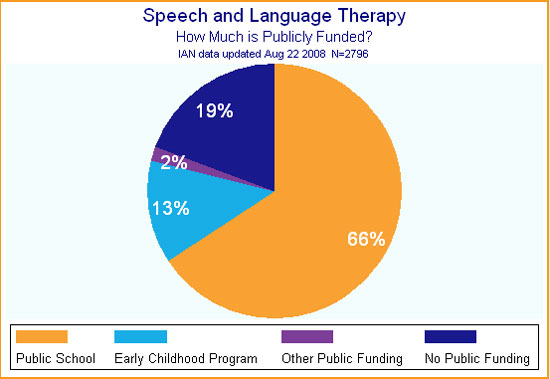 Families with a speech disordered child often face a financial burden due to the high cost of speech therapy and other needed treatments. In fact, a survey published in Public Health Reports found that 40% of American families with children with special needs report feeling the strain of the financial toll that those healthcare needs cause. The survey further reported that children with disabilities are more likely to grow up in single-parent households, and that those parents often hold lower-paying jobs.
Families with a speech disordered child often face a financial burden due to the high cost of speech therapy and other needed treatments. In fact, a survey published in Public Health Reports found that 40% of American families with children with special needs report feeling the strain of the financial toll that those healthcare needs cause. The survey further reported that children with disabilities are more likely to grow up in single-parent households, and that those parents often hold lower-paying jobs.
As you can undoubtedly attest to, the mere cost of speech therapy isn’t the only factor in the equation. You’ve probably had to take time off of work numerous times to take your child to speech therapy sessions and other treatment sessions. And you probably spend much of the rest of your time researching new at-home speech therapy techniques and working on articulation practice with your child. In fact, you probably spend your nights in realistic, lucid dreams rehearsing speech therapy techniques. But that’s vastly preferable to dreaming about speech therapy bills and denied insurance forms. And after developing a financial plan of attack with our tips, you may be able to reduce the nightmarishly high cost of speech therapy.
Insurance
If you’re not sure if your insurance will cover the cost of speech therapy, talk to your employer’s human resources representative. If you’re uninsured or underinsured, contact the appropriate department in your state for information on insurance programs.
Flexible Spending Accounts
Ask your employer if he offers a flexible spending account (FSA). An FSA allows you to designate a portion of your income for qualifying medical and childcare expenses. The income is not subject to payroll taxes, which can save you a nice chunk of change.
Shop Around
Talk to several speech-language pathologists (SLP) in your area and compare their rates. Speech Buddies Connect is an easy way to message a lot of local and virtual therapists, fast. You can also contact local universities and colleges in your area and ask them if they have speech therapy clinics. At a university-sponsored speech therapy clinic, your child can often receive treatment at a reduced rate by graduate students who are supervised by SLPs.
Combine Your Options
Even if your child does qualify for free speech therapy sessions under early intervention or special education programs, he might need extra help. If your Individualized Education Program (IEP) team refuses to add more speech therapy sessions to his weekly schedule and filing a complaint gets you nowhere, consider combining public and private speech therapy. You won’t have to pay the full burden, and your child will get the help he needs.
Sliding Scale
Many hospitals, clinics, and early childhood centers offer services based on a sliding scale. It’s always worth asking your child’s speech therapist if she offers a reduced fee or sliding scale program based on your income.
Network
Join a support group for parents of speech disordered children. If you can’t find one in your area, create one. Network with other local parents and gauge the interest for a support group. Ask the other parents if they might consider hiring a speech therapist to do group sessions for all of the youngsters. The SLP will almost certainly increase her speech therapy rates for group sessions, but the cost will still be lessened when split amongst a group.
Source: Speech Buddies


